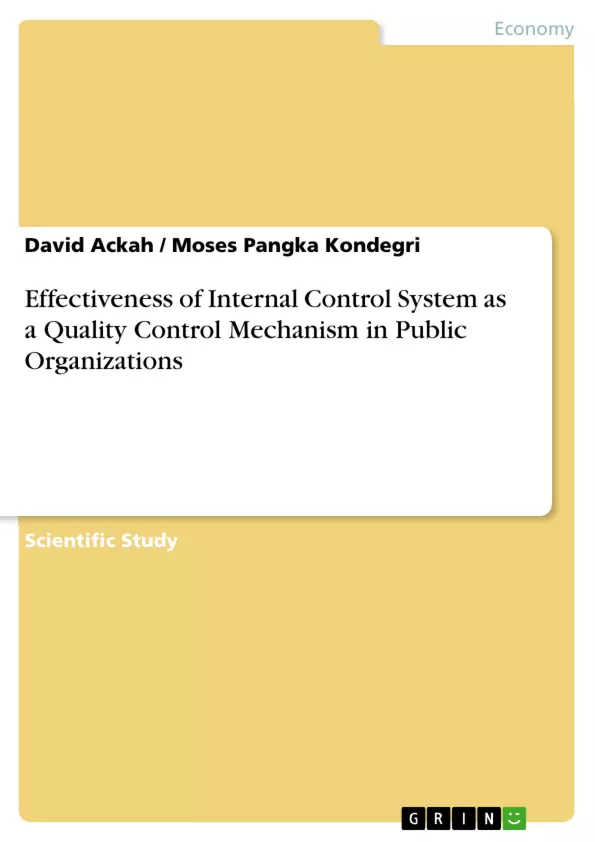The purpose of this study was to look into effectiveness of internal control system as a quality control mechanism in Internal Revenue Service, Koforidua so as to improve cash inflows and internal control measures as far as possible cash outflows. Simple random sampling was used in eliciting data from the members of the population. The instruments used in collecting data were questionnaire, interviews, observation and document analysis. The main results of the study was that even though Internal Revenue Service had a very effective policies, strategies and procedures with regards to cash receipts, cash payments and cash investments strict implementation of these policies strategies and procedures is not very encouraging
Table of Contents
- 1.0 INTRODUCTION
- 1.1 BACKGROUND OF THE STUDY
- 1.2 STATEMENT OF THE PROBLEM
- 11.3 OBJECTIVES OF THE STUDY
- 1.4 RESEARCH HYPOTHESIS
- 1.5 SIGNIFICANCE OF THE STUDY
- 1.6 SCOPE OF THE STUDY
- 1.7 LIMITATIONS
- SAMPLE SIZE
- LITERATURE REVIEW
- 2.1 HISTORICAL BACKGROUND OF INTERNAL REVENUE SERVICE
- 2.2 INTERNAL CONTROL
- 2.3 TYPES OF INTERNAL CONTROL SYSTEM
- 2.4 QUALITIES OF INTERNAL CONTROL SYSTEM
- 2.5 CONTROLS IN THE PUBLIC SECTOR
- 2.5.1 PARLIAMENTARY CONTROL
Objectives and Key Themes
This research aims to assess the effectiveness of the internal control system as a quality control mechanism within the Internal Revenue Service (IRS) in Koforidua, Ghana. The study seeks to improve cash inflows and internal control measures to minimize cash outflows. It analyzes how the IRS complies with control measures outlined in its regulations, examines the effectiveness of the internal control system in preventing financial malpractice, and identifies the sources of such malpractice.
- Effectiveness of Internal Control Systems in Public Organizations
- Financial Malpractice and Fraud Prevention
- Compliance with Regulations and Internal Control Measures
- Quality Control Mechanisms in Public Organizations
- Cash Management and Financial Performance
Chapter Summaries
The introduction provides a detailed overview of the research project, including the problem statement, objectives, hypothesis, significance, scope, limitations, and sample size. It emphasizes the importance of effective internal control systems in organizations to safeguard assets, ensure accurate accounting records, and minimize financial malpractice.
The literature review delves into the historical background of the IRS, exploring its structure, organizational changes, and key legislation governing its operations. It defines internal control systems and discusses their various types, including segregation of duties, physical controls, authorization and approval, arithmetic and accounting controls, and the importance of competent personnel. This section also highlights the qualities of an effective internal control system, including understandability, flexibility, sufficiency, and a non-punitive approach.
The chapter on controls in the public sector examines the three distinct levels of controls in government finance: Parliamentary Control, Treasury Controls, and Departmental Controls. It discusses the role of parliamentary appropriation and audit control, emphasizing the importance of budget approvals and financial oversight. Further, it details the mechanism of audit control, highlighting the pre-audit of payment vouchers and journal vouchers to ensure order and accuracy.
Keywords
The research focuses on the effectiveness of internal control systems as a quality control mechanism in public organizations. Key terms and concepts include financial malpractice, fraud prevention, compliance with regulations, cash management, and financial performance. The study emphasizes the importance of effective internal control systems in achieving organizational objectives and safeguarding assets.
Frequently Asked Questions
What is the purpose of an internal control system in public organizations?
The system aims to safeguard assets, ensure accurate accounting records, prevent financial malpractice, and improve the management of cash inflows and outflows.
What was the main finding of the study at the IRS in Koforidua?
The study found that while effective policies and procedures existed, the strict implementation of these measures was not encouraging, leading to potential vulnerabilities.
What are the different types of internal controls?
Common types include segregation of duties, physical controls, authorization and approval processes, and arithmetic or accounting controls.
How can financial malpractice be prevented in the public sector?
Prevention requires strict compliance with regulations, regular audits, and the employment of competent, honest personnel within a flexible and understandable control framework.
What role does Parliament play in financial control?
In Ghana, Parliamentary Control involves budget approvals and oversight through appropriation and audit controls to ensure public funds are spent as intended.
- Quote paper
- David Ackah (Author), Moses Pangka Kondegri (Author), 2013, Effectiveness of Internal Control System as a Quality Control Mechanism in Public Organizations, Munich, GRIN Verlag, https://www.grin.com/document/285561



